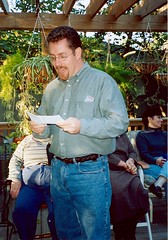JoCoLibrary's Winter Gaming Tourney
This is a really quick post about something that I was lucky enough to experience today ... the Johnson County Library's Winter Gaming Tournament (JoCoWGT)! Though just a pilot program (a precurser of cool things to come!), we brought in thirty 15-19 year-olds to play for the JoCoWGT championship ... it was completely fantastic!
My job was your typical administrative fare ... walking around talking to teens, parents, and the media. We got great coverage from KMBC Channel 9 and the Kansas City Star, and everyone really had a great time. In fact when it was over, some of the participants were still hanging out asking us when we were going to do it again.
My favorite story was from a woman who's son came home with a flyer for the event, and asked if he could play. His mom (already a JoCoLibrary booster) told him she would let him play, and would even take off work and drive him to the library ... but there was a catch ... he needed to get A's and B's on his report card. The young man answered that because he was going to a really good school, C's should be considered good grades. His mom stood firm ... A's and B's ... or no gaming. Well, the kid took it to heart ... he got all A's and B's ... and in the end finished second in the JoCoWGT to boot!
This is the kind of thing we should be doing ... giving people great places and opportunities to have shared experiences for learning, interaction, and engagement ... While some of the participants brought their parents, others came with friends, and some came alone ... by the end of the day, everybody (regardless of age) talked and joked like old pals ... there was energy in the room and it passed through all of us. I don't know if it was "Library 2.0" or not, but it was definitely "JoCoLibrary.NOW"

